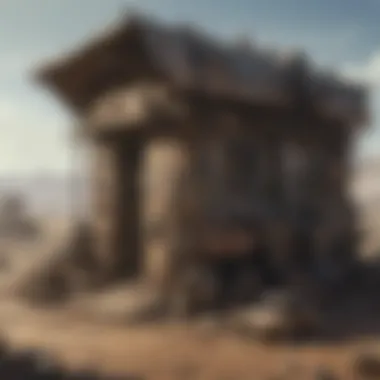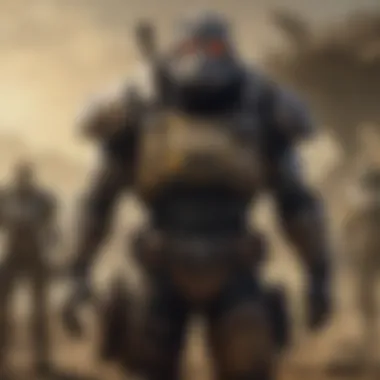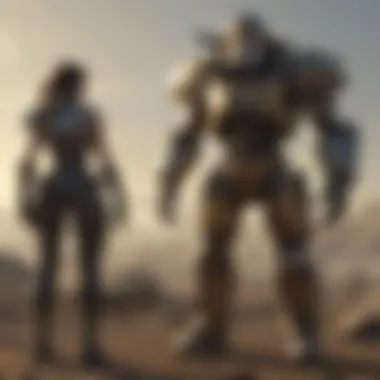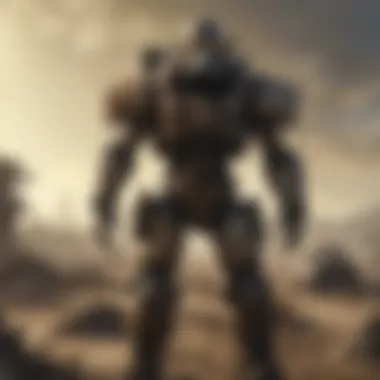Exploring Raiders in the Fallout Universe


Intro
In the vast expanse of the Fallout universe, few groups resonate as much as the Raiders. These characters encapsulate the chaotic and often brutal realities of a post-apocalyptic society. Understanding Raiders is essential for a deeper appreciation of the Fallout narrative and the complexities woven into its lore. This article provides insight into the evolution of Raiders, their significance within the games, and the factions that exist within their ranks. By dissecting their identity, players can understand not only the motivations of their foes but also the moral dilemmas that the Fallout series frequently explores.
Lore Insights
Overview of the Fallout Universe
The Fallout universe is defined by its desolate landscapes and remnants of human civilization following a nuclear cataclysm. It offers a unique blend of retrofuturism and dark humor, laying the groundwork for an intricate narrative. Raiders emerge as one of the key antagonistic forces within this setting, emphasizing the theme of survival amidst chaos. Their presence is a stark reminder of humanity's darker impulses when societal structures collapse.
Key historical events in the Fallout timeline
Several historical milestones significantly influenced the emergence of Raiders:
- The Great War of 2077 initiated widespread destruction and left many individuals foraging in the remains of civilization.
- The collapse of governmental institutions and the rise of factions shaped the power dynamics in the wasteland.
- As communities struggled to maintain order, Raiders capitalized on lawlessness, establishing their identities outside traditional moral constraints.
Deep dive into the backstory of major factions and characters
Different Raider factions exist across the series, each with unique ethos and values. For instance, the Raiders of the Mojave showcase a brutal survivalist mentality, while factions like the Pack exhibit a more wild, animalistic nature. Notable characters such as Viper and Murder exemplify these traits, showcasing how individuals operate within the confines of their factions. Understanding these elements helps players recognize themes of loyalty, survival, and moral ambiguity.
"Raiders serve as reflections of the primal human instinct to survive, often at the cost of others."
By diving into their culture and motivations, players can find richer context behind the Fallout gameplay experience. This exploration sets the stage for a deeper understanding of the series' narrative complexities, emphasizing the dynamic tension that pervades interactions with Raiders.
The Concept of Raiders in Fallout
To understand the role of Raiders in the Fallout universe, one must first appreciate their function as pivotal elements within the game’s narrative framework. Raiders embody the chaos and lawlessness that characterize the post-apocalyptic landscape. They serve not only as adversaries but as reflections of the game’s broader themes of survival and moral decay. Examining Raiders allows players to engage with the moral implications of their actions and decisions throughout the game.
Defining Raiders
Raiders in the Fallout franchise are essentially groups of hostile survivors who resort to violence, pillaging, and intimidation to survive. Unlike other factions, they often prioritize personal gain over community welfare. Their strategies can include ambushes on travelers or seizing control of settlements. This behavior sets them apart from other groups, such as scavengers or traders, who typically engage in more constructive interactions.
Raiders can vary significantly from game to game, with each installment presenting unique factions with differing philosophies and cultures. Despite these differences, their core identity as marauders and enemies remains intact. Players encounter various Raider factions, each showcasing distinct styles, abilities, and motivations, which contribute greatly to the overall gameplay experience.
Raiders as Antagonists
In the Fallout series, Raiders function primarily as antagonists. They present immediate threats to the player, impacting the game’s pacing and tension. Their presence forces players to adapt and strategize, enhancing the gameplay challenge.
Raiders often have some narrative depth, making them more than just faceless enemies. They can embody broader themes such as desperation, aggression, and the struggle for power. Engaging with Raiders challenges players' morals, as decisions must often be made to confront or avoid conflict.
"In the desolate world of Fallout, Raiders serve as a grim reminder of humanity's darker impulses in the face of adversity."
The portrayal of Raiders varies across the franchise, from simple thugs to organized and sophisticated clans. Some can even present vestiges of humanity or camaraderie among their ranks, complicating the player's interactions with them. Understanding this dynamic allows players to better grasp the context of their actions and the consequences that follow in the wasteland.
Historical Context of Raiders


The historical context of Raiders is crucial in understanding their role in the Fallout universe. By examining the origins and evolution of Raider culture, one can appreciate how these characters became essential components of the game’s narrative. The details of their backstory enrich gameplay and specifically influence player interactions. This offers deeper insights into moral choices and faction dynamics, showcasing the complexities of post-apocalyptic life.
Origins of Raider Culture
Raider culture emerged from the wreckage of society following the Great War. As civilization collapsed, people faced scarcity, violence, and despair. This backdrop forged groups of survivors ready to adopt aggressive methods for survival. Raiders were not merely criminals; they were a response to their environment. Often, they stemmed from larger community failures or as a reaction to societal collapse, leading to their unique identities.
The need for resources drove many to join Raider factions. Raiders often raid settlements not only to survive but to assert dominance in a brutal new world. Moreover, some factions, like the Red Rocket Raiders, formed from former mechanics and laborers, which reflects how previous professions influenced their current identities.
Evolution Over the Games
As the Fallout series expanded, Raiders evolved in terms of complexity and portrayal across different titles. Initially, they were one-dimensional foes, serving primarily as obstacles for players. However, as the franchise progressed, devlopers began to imbue them with more nuanced traits. In Fallout 3 and Fallout 4, Raiders exhibit a range of behaviors, from ruthless marauders to those struggling for survival within their morally ambiguous world.
New factions emerged, each with distinct philosophies and aesthetics. For instance, in Fallout New Vegas, the varied motivations of California's Raider factions highlight ideological differences, showcasing that not all Raiders pursue chaos for its own sake. This evolution reveals that Raiders, while often misrepresented as mere villains, have deeper motivations rooted in survival instincts, history, and human behaviors shaped by extreme circumstances.
Ultimately, understanding the historical context leads to a richer gameplay experience. It provides a framework for players to engage with the narrative meaningfully, making informed choices about allies and enemies in this harsh existence.
Characteristics of Raiders
Understanding the characteristics of Raiders is pivotal to grasping their role in the Fallout universe. These traits not only establish raiders as formidable adversaries but also reflect the broader themes of survival and morality in a post-apocalyptic setting. In this section, we will examine common traits and behaviors of raiders, as well as delve into notable raider factions, enhancing our comprehension of the game's narrative and its implications.
Common Traits and Behaviors
Raiders often embody a series of defining behaviors that highlight their role within the wasteland. These traits include:
- Aggression: Raiders are frequently hostile. They prioritize immediate threats and will attack on sight. This aggression serves not only to protect their territory but also to instill fear in others.
- Resourcefulness: Many Raiders display cleverness in scavenging. They repurpose items they loot from the wasteland, demonstrating a keen ability to adapt in dire situations. This resourcefulness reflects the harsh realities of survival, emphasizing the necessity of finding value in discarded materials.
- Hierarchy: Raiders often have a structured hierarchy within their groups. Leaders tend to make strategic decisions, while followers execute orders. This organization can lead to conflict but also highlights their need for cooperation in a hostile world.
- Lack of Morality: Raiders are typically indifferent to ethical considerations. Their actions often focus on self-interest, disregarding the consequences of their violence or theft on others.
These traits collectively help shape the Raider identity in the Fallout universe, making them central figures in the game's exploration of human nature under extreme conditions.
Raider Faction Notables
Exploring specific raider factions reveals how different groups within the Raider community adapt and evolve, each bringing distinct characteristics to the table. Three notable factions are Red Rocket Raiders, Goodneighbor Raiders, and Highwaymen.
Red Rocket Raiders
The Red Rocket Raiders are particularly interesting due to their origin and operation style. This faction tends to occupy petrol stations, which they use for supplies and as makeshift bases. A key characteristic of the Red Rocket Raiders is their eccentric customization of vehicles, turning old wrecks into rough transportation. This is not only a means of transport but also signals their tribal approach to resources, using what is available to them.
The uniqueness of Red Rocket Raiders lies in their creative repurposing of remnants of civilization. Their vehicles can be both a tactical advantage and a signal of instability, as they can attract attention from other factions due to their noisy machinery.
Goodneighbor Raiders
In contrast, Goodneighbor Raiders operate in a more urban setting, within the remnants of a city. Their approach to raiding is more strategic, often involving negotiation or intimidation. A significant characteristic of this faction is their ties to the community around them, sometimes establishing alliances with residents for protection against common enemies.
Goodneighbor Raiders stand out for their ability to navigate the complexities of urban life in the wasteland. This adaptability can be seen as beneficial, as they can gather intelligence and resources more effectively than isolated groups. However, this can also lead to moral ambiguity, as their alliances can shift based on convenience rather than loyalty.
Highwaymen
Highwaymen are a unique faction that thrives on ambush and mobility. They are known for their hit-and-run tactics, often striking travelers who venture along highways. A defining characteristic of Highwaymen is their speed and stealth, allowing them to evade retaliation after an assault. Their hit-and-run tactics emphasize the importance of mobility in their survival strategy.


The unique feature of Highwaymen is their use of scavenged vehicles and bicycles. This advantage allows them to cover large distances quickly and ambush their targets effectively. However, their lifestyle also carries risks, as being exposed on open roads can be dangerous.
Understanding these raider factions adds depth to the player's experience in the Fallout universe. The diverse characteristics and strategies employed by these groups enhance the narrative while contributing significantly to gameplay dynamics, framing them as not just enemies, but complex entities within the game's world.
The Role of Raiders in Gameplay
Raiders feature prominently in the gameplay mechanics of the Fallout series. They serve not only as adversaries but also as catalysts for interaction and exploration. Encountering Raiders forces players to engage in combat, strategize their approach, and often make choices that impact their gameplay experience. Thus, understanding the role of Raiders adds depth to how players interact with the game's world and narrative.
Encounter Mechanics
The mechanics behind encounters with Raiders are pivotal to the overall gaming experience. These interactions can occur suddenly and with little warning, adding an element of surprise to the game. Players might stumble upon a Raider camp while exploring, or they may trigger an encounter while completing a mission. The design of these encounters often reflects the chaotic nature of the post-apocalyptic environment.
Players can approach encounters in various ways:
- Combat: Engaging Raiders in direct combat requires a sound understanding of the player's own skills and weaponry. Raiders can vary significantly in difficulty, with stronger factions absorbing more damage and posing a higher threat.
- Stealth: Choosing not to engage in a frontal assault is an option. Players may opt to use stealth mechanics to sneak past or pick off Raiders quietly, preserving valuable resources.
- Negotiation: Rarely, players might interact with some Raiders in a way that allows for negotiation or coexistence, though this is less common.
These diverse mechanics ensure that players must adapt their tactics constantly, enhancing replayability. The way players choose to handle Raider encounters impacts not just their immediate survival but also their overall experience in the Fallout universe.
Loot and Rewards
Looting Raiders is another critical aspect of their role in gameplay. Successful encounters often yield valuable loot that players can use to improve their equipment, which is essential for survival in the hostile wasteland.
Loot can include:
- Weapons: From makeshift melee weapons to firearms, raiders carry items that can be salvaged for a player's arsenal.
- Armor: Looting Raiders may provide various pieces of armor, often in various states of repair or customization.
- Supplies: Players can acquire essential survival supplies such as food, drink, and medical gear, all of which are crucial for long expeditions.
The loot system encourages players to think strategically about Raider encounters. The potential rewards can significantly offset the risks taken during combat, motivating players to engage with these factions. Moreover, as they progress, players often find themselves weighing their options. The decision to fight or avoid Raiders changes based on the resources they need at any given moment.
In summary, the role of Raiders in Fallout transcends mere opposition. They introduce complex gameplay dynamics that enrich the player's journey, enhance the sense of danger within the world, and offer rewarding outcomes following hard-fought encounters.
Moral Implications of Raiders
The moral implications of Raiders in the Fallout universe are multifaceted and significant. They represent not only the antagonistic force within the games but also a reflection of human behavior when faced with the dire circumstances of a post-apocalyptic world. As players engage with these characters and the associated ethical dilemmas, they encounter deeper themes of survival, morality, and the extent of human depravity.
Understanding the moral implications surrounding Raiders enriches the player's experience. Essentially, it forces a confrontation with the notion of right and wrong in a landscape where societal norms have largely crumbled. Players must decide whether to combat these factions outright, negotiate, or even join them, leading to diverse gameplay experiences and varied outcomes.
Raider Actions and Player Choices
Raider actions can be seen as both confrontational and opportunistic. They often engage in violent raids, focusing on theft, murder, and coercion. This acts as a narrative backdrop that influences player choices significantly. For instance, when players encounter a Raider camp, they may choose to attack, stealthily navigate through, or attempt dialogue.
Players also have the power to shape their morality through their interactions:
- Choosing Violence: Players who consistently opt to engage Raiders directly might find themselves hardened, reflected in their character’s development.
- Negotiation: Others may try to broker peace, revealing layers within both the player's character and the Raider factions.
- Joining Forces: Some players might even align with a Raider faction for personal gain, illustrating a departure from traditional heroism.
Each decision carries weight, not just in individual gameplay but also in the overall portrayal of morality in the wasteland.
"The choices players make regarding Raiders often reflect their views on morality and ethics in extreme circumstances."


Consequences in the Wasteland
The consequences of Raider interactions resonate throughout the wasteland, impacting locations, factions, and the player's journey. When players decide to confront or negotiate with Raiders, several potential outcomes emerge:
- Faction Relationships: Engaging with Raiders can create tensions with other factions like the Brotherhood of Steel or the Railroad, leading to complex alliances or rivalries.
- Loot and Resources: Successful raids or negotiations can yield valuable supplies, weapons, and information. These resources can crucially aid in survival or enhance capabilities in subsequent encounters.
- Social Dynamics: Player actions may also influence how other NPCs view Raiders, shaping their narratives. Merchants and settlements could react with fear or hostility depending on the player's choices.
The representation of Raiders can serve as a lens through which players explore the challenges of humanity in dire circumstances. Therefore, moral implications tied to the Raiders not only shape gameplay but also stimulate philosophical reflections on survival, ethics, and the gray areas that define humanity's darker impulses.
Cultural Representations of Raiders
The cultural representations of Raiders provide an important lens through which to analyze their role and significance in the Fallout universe. These depictions extend beyond mere gameplay mechanics; they explore themes of survival, morality, and the human condition in a post-apocalyptic setting. Understanding these representations helps players grasp the broader narrative and the emotional resonance that Raiders embody in the game.
Media Depictions
Raiders have been portrayed in various media associated with the Fallout franchise, including games, comics, and promotional materials. In these depictions, they embody chaos and lawlessness, often portrayed as savage or brutal figures. This portrayal serves to highlight the harsh realities of the post-apocalyptic world, where societal norms have broken down.
For example, the Raiders in Fallout 3 are often depicted as ruthless marauders that attack travelers and settlers. Their visual design often includes makeshift armor and weaponry, reinforcing the idea of survival through scavenging and aggression. Narratively, they serve to illustrate a world where desperation leads to violence. This aggressive portrayal raises questions about morality and ethics in survival situations.
Additionally, media interpretations in fan art and community discussions further expand the understanding of Raiders. Often, these representations highlight their motivations beyond mere violence. Fans dissect the culture of Raiders, exploring potential backstories and psychological profiles. This adds depth to their portrayal and challenges the notion of them as one-dimensional villains, encouraging a more nuanced perspective.
Player Interpretations and Fan Theories
Player interpretations of Raiders can vary significantly, influenced by personal experiences and gameplay choices. For many players, encounters with Raiders prompt a sense of conflict. They are forced to consider their own morality when deciding to confront or negotiate.
Fan theories also play a critical role in shaping the perception of Raiders. Some speculate that Raiders represent the remnants of a pre-war society that valued competition and individualism, a reflection of human nature when societal structures collapse. Others theorize that Raiders may symbolize the struggle between civilization and anarchy, suggesting that even the most savage beings can exhibit glimmers of humanity.
These interpretations are enriched by discussions on platforms like Reddit and fan forums, where players share stories and theories. Here, the community collectively engages in dissecting the complexities of Raider identity.
Understanding Raiders as cultural symbols enriches the gameplay experience
Future of Raiders in Fallout
The future of Raiders in the Fallout universe holds significant implications for the franchise. As players have engaged with these factions over the years, their evolution reflects the broader themes of survival, morality, and community dynamics in a fractured world. Understanding where Raiders might head next is crucial for the narrative depth and player experience in future installments of the series.
One of the vital elements to consider is how new storytelling techniques can further explore the motivations behind Raider actions. Developers may decide to humanize these factions more, providing backgrounds and internal conflicts that complicate their roles as mere antagonists. This would open avenues for quests that might prompt players to reevaluate their choices, creating a more immersive experience.
Furthermore, the potential integration of advanced AI systems could lead to more unpredictable Raider encounters, adjusting their strategies based on player actions. This could enhance the challenge and make each player’s journey unique, as what worked in one game might not in another. The inherent unpredictability can maintain engagement and lower the risk of monotony.
Potential Developments
Several potential developments could reshape Raiders in the Fallout franchise. The first is an increase in faction complexity. Instead of clear-cut good versus evil narratives, more nuanced motivations for Raiders could emerge. Their portrayal might shift towards showing them as products of their environment rather than solely villains. Potential storylines could revolve around resource scarcity or past traumas that have shaped their societal structures.
Another significant aspect might be the enhancement of faction interactions. Players could see alliances forming and breaking among various Raider groups based on player decisions, game updates, or narrative developments. This could lead to multiple outcomes for quests that do not always align with traditional moral choices, allowing for a more layered gameplay experience.
Importantly, the inclusion of new Raider factions could introduce fresh dynamics. Each faction could focus on different aspects of survival, from mercenary-based operations to cult-like beliefs centered on wasteland deities. The introduction of vibrant, diverse Raider communities could create exciting new gameplay opportunities, leading to more engaging interactions for players.
Community Speculations
Speculations from the community reflect a vibrant exchange of ideas regarding the future of Raiders. Players often discuss hypothetical situations based on their experiences and the lore of previous games. Many are curious about the impact of upcoming game titles or expansions on Raider factions.
Discussions on platforms like Reddit and Facebook often highlight the desire for a more robust narrative arc connected to Raiders. Players express interest in understanding the origins of specific Raider factions or their relationship with other in-game groups. This reflects a broader desire for richer lore alongside gameplay mechanics.
There is also a prevalent theory that future games might tap into current social dialogues. This could entail introducing themes of tribalism and community governance as players navigate the challenges presented by Raider factions. By reflecting real-world issues, the developers could ground the narrative into deeper discussions about human nature in a post-apocalyptic world.







